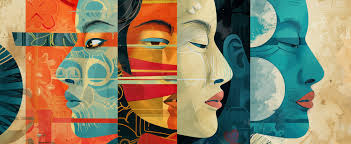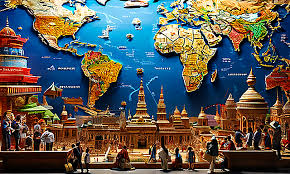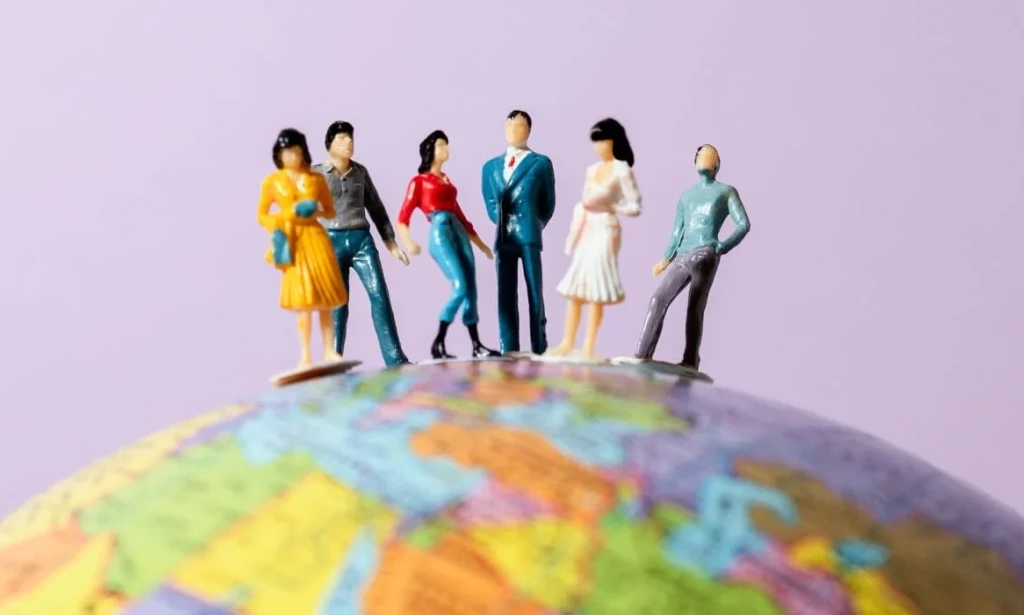Culture shapes how individuals perceive the world and interact with others. It influences values, traditions, language, and even the way we think and behave. In today’s rapidly changing world, understanding culture is more important than ever. From family customs to global communication, culture impacts nearly every aspect of our lives. This article explores the role of culture in shaping personal identity, society, and its significance in a globalized world.

1. The Influence of Culture on Personal Identity
Culture is a significant part of personal identity, influencing the way we define ourselves and our place in the world.
- Cultural Heritage: An individual’s background, including their ethnic group, traditions, and customs, plays a crucial role in how they view themselves. The values and practices passed down through generations shape personality traits, beliefs, and social behavior.
- Cultural Symbols: Cultural symbols, such as clothing, language, and art, offer a way for individuals to express their identity. These symbols can evoke feelings of pride and connection to one's roots, fostering a sense of belonging.
- Adaptation and Transformation: As people move between cultures or live in diverse environments, they often adapt their identity to blend elements from different cultures. This process, known as cultural adaptation, can lead to a fusion of identities, where personal identity becomes an intersection of multiple cultural influences.
2. The Role of Culture in Society
Culture not only shapes individuals but also influences entire societies, affecting everything from governance to community practices.
- Social Norms and Values: Every society has its own set of social norms and values, which are deeply rooted in its culture. These norms dictate acceptable behaviors, roles, and expectations within the community. For example, some cultures prioritize collectivism, while others focus on individualism.
- Traditions and Rituals: Cultural traditions, whether they are religious ceremonies, holidays, or daily rituals, provide a sense of continuity and stability. They foster community bonding and reinforce shared beliefs, helping societies maintain a strong sense of identity over time.
- Cultural Diversity and Tolerance: In increasingly multicultural societies, cultural diversity brings both opportunities and challenges. The mixing of cultures often leads to a broader understanding and tolerance of different ways of life. However, it can also create tensions and misunderstandings, making cross-cultural communication essential for harmony.
3. Culture in the Age of Globalization
Globalization has made the world more interconnected, and as a result, cultures are continuously influencing one another.
- Cultural Exchange: With globalization, people have easier access to foreign ideas, products, and experiences. Cultural exchange, through travel, trade, and media, has enriched societies, introducing new art forms, food, fashion, and even languages.
- Cultural Appropriation vs. Appreciation: As cultures mix, it’s important to distinguish between cultural appropriation (taking elements of another culture without permission or understanding) and cultural appreciation (respectfully learning about and honoring another culture). The debate on cultural appropriation highlights the need for cultural sensitivity and awareness in a globalized world.
- Preserving Cultural Heritage: While globalization promotes cultural exchange, it also poses a threat to the preservation of traditional cultures. As younger generations adopt global trends, there’s a risk of losing indigenous languages, customs, and practices. Efforts to preserve cultural heritage, through museums, language revitalization programs, and cultural festivals, are crucial to maintaining cultural diversity.

4. Technology and the Evolution of Culture
Technology has become a powerful force in the evolution of culture, especially in the digital age.
- Digital Media: The rise of the internet, social media, and streaming platforms has allowed individuals to access and share cultural content globally. Movies, music, and literature from different parts of the world are now readily available, creating a shared global culture while maintaining distinct regional identities.
- Virtual Communities: Online platforms enable people from diverse backgrounds to form communities based on shared interests, such as gaming, politics, or fashion. These virtual spaces transcend geographical boundaries, allowing for cultural exchange and the blending of ideas on a global scale.
- Impact on Communication: Technology has transformed how we communicate and interact with others. Social media platforms have created a new form of communication where individuals can showcase their cultural identities, creating both opportunities for connection and challenges in managing cultural differences.
5. The Future of Culture in a Changing World
The future of culture will continue to evolve as societies face new challenges and opportunities.
- Cultural Preservation vs. Modernization: The balance between preserving traditional cultural practices and adapting to modern lifestyles will continue to be a challenge. As the world becomes more interconnected, future generations may need to find ways to maintain cultural integrity while embracing technological and societal advancements.
- Cultural Innovations: The ongoing fusion of technology and culture is likely to lead to new forms of artistic expression, entertainment, and social movements. As new generations embrace emerging technologies such as virtual reality and augmented reality, they will shape culture in new and unexpected ways.
- Global Collaboration and Understanding: With the increasing need for global collaboration in addressing issues like climate change, social justice, and economic inequality, culture will play a key role in fostering mutual respect, understanding, and shared responsibility across borders.

Conclusion
Culture is a dynamic and influential force that shapes individuals, communities, and societies. It plays a central role in personal identity and societal norms, while globalization and technology continue to shape its evolution. In today’s interconnected world, understanding and appreciating cultural diversity is essential for creating inclusive, empathetic, and harmonious communities. As we move into the future, culture will remain a vital part of the human experience, adapting and evolving in response to changing societal dynamics and technological advancements.


You must be logged in to post a comment.